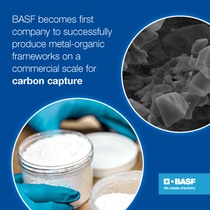Media
BASF becomes first company to successfully produce metal-organic frameworks on a commercial scale for carbon capture
- Production scale-up of MOF successfully completed for Canadian technology provider Svante Technologies Inc.
- MOFs will be applied in Svante’s own carbon capture technology
- BASF has capacity to produce customized MOFs at multiple sites
BASF is the first company to produce metal-organic frameworks (MOFs) on a production scale of several hundred tons per year. MOFs are highly crystalline structures with nanometer-sized pores and a large surface area. This structure offers a high capacity for the storage of carbon dioxide (CO2), the dehumidification of air for room climate control, and the adsorption of the greenhouse gas methane. BASF has developed expertise on the scale-up and production of MOFs, can tailor MOFs to customers’ needs and specifications, and today has the capacity to produce customized MOFs for various applications and industries.
A first project has now been successfully completed for Canadian carbon capture and removal solutions provider Svante Technologies Inc. (Svante). The interdisciplinary BASF team of researchers, scale-up experts and engineers worked collaboratively on the scale-up by converting the Svante lab recipe into a safe plant procedure for large scale production. The MOFs produced will be used as solid sorbents for carbon capture projects. The collaboration with Svante will help to significantly reduce carbon emissions in various industrial sectors including hydrogen, pulp and paper, cement, steel, aluminum and chemicals.
“We are very happy to partner with Svante and to be able to apply our scale-up and production expertise. We are proud to be the first company to produce MOFs successfully on a large commercial scale for carbon capture. The successful effort of our teams in R&D, scale-up and production puts us in a favorable position. Today, we have access to new business opportunities with a strong focus on sustainability based on our MOF production capabilities. MOFs have the potential to be a step change in our efforts to reduce CO2 emissions and can bring our partners and their customers closer to reaching their net zero targets,” said Detlef Ruff, Senior Vice President, Process Catalysts at BASF.
About BASF process catalysts
BASF process catalysts is a leading global manufacturer of catalysts for the chemical industry, with solutions across the chemical value chain. The business comprises chemical catalysts and adsorbents, refinery catalysts and custom catalysts. Priority is given to developing new and improved products that enable the chemical industry transformation to net-zero emissions.
The catalysts division’s portfolio also includes battery materials and recycling solutions, as well as environmental catalysts and metal solutions. Customers from a variety of industries including Automotive & Transportation, Chemicals, Plastics or Energy & Resources benefit from our innovative solutions. Further information on BASF’s Catalysts division is available on the Internet at www.catalysts.basf.com.
About BASF
At BASF, we create chemistry for a sustainable future. We combine economic success with environmental protection and social responsibility. More than 111,000 employees in the BASF Group contribute to the success of our customers in nearly all sectors and almost every country in the world. Our portfolio comprises six segments: Chemicals, Materials, Industrial Solutions, Surface Technologies, Nutrition & Care and Agricultural Solutions. BASF generated sales of €87.3 billion in 2022. BASF shares are traded on the stock exchange in Frankfurt (BAS) and as American Depositary Receipts (BASFY) in the United States. Further information at www.basf.com.
P-23-327

